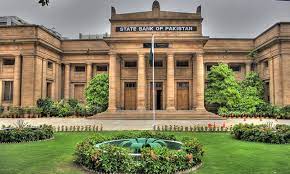PTBP Web Desk
The State Bank of Pakistan (SBP) has granted a one-year extension to exchange companies (ECs) for the import of cash US dollars. This extension allows ECs to import up to 50 percent of the value of their export of permissible foreign currencies through reputable cargo or security companies until June 30, 2025.
This policy, originally introduced to streamline the flow of cash US dollars in the market, was initially set to expire in December 2023 but has now been extended twice due to ongoing market needs and currency flow management.
In an effort to regulate foreign currency movements and ensure a stable supply of cash US dollars in the open market, the SBP had previously set certain limitations and conditions for exchange companies. Initially, these companies were allowed to export foreign currencies, excluding US dollars, through authorized cargo or security companies. Upon exporting permissible foreign currencies, the ECs were required to repatriate the equivalent value in US dollars into their foreign currency accounts held at Pakistani banks within five working days from the date of export.
However, in July 2023, the SBP took a significant step by revising its Exchange Companies Manual (ECM) and allowing exchange companies to import cash US dollars. This move was made to further support the currency market by ensuring sufficient availability of dollars, which was especially important given the global economic conditions and the need to maintain stable currency reserves.
Under this policy, as of July 25, 2023, exchange companies were authorized to import cash US dollars equivalent to up to 50 percent of the value of their export consignments of permissible foreign currencies. This permission was limited to the period until December 31, 2023, with the condition that the total cash US dollars imported by an exchange company during this period should not exceed the specified limit. This policy revision allowed the exchange companies more flexibility to meet market demands while maintaining regulatory oversight.
As the December 2023 deadline approached, market conditions indicated a continuing need for the import of cash dollars. In response, the SBP announced its first extension of the policy in March 2024. This six-month extension allowed exchange companies to continue importing cash US dollars until June 30, 2024, under the same condition that no more than 50 percent of the value of exported foreign currencies could be repatriated in cash dollars.
This extension was welcomed by exchange companies, as it ensured adequate supply of US dollars in the local currency market, helping to stabilize the exchange rate. The extension reflected the SBP’s proactive approach to managing currency flows in a way that balanced market demand with regulatory controls.
On Monday, the SBP announced another extension of the cash dollar import policy, granting exchange companies an additional year—until June 30, 2025—to continue importing cash US dollars. The decision came as part of the SBP’s ongoing efforts to maintain adequate supplies of cash dollars in the open market, which is essential to meeting both business and consumer demands for foreign exchange.
According to the circular issued by the SBP, the terms and conditions of this facility remain unchanged. Exchange companies are still required to follow the guidelines laid out in the initial policy, including the 50 percent limit on imported cash dollars relative to their export consignments. The SBP reiterated that this extension aims to ensure a smooth flow of foreign currency into the market while adhering to all regulatory guidelines.
Under this policy, exchange companies must provide prior written intimation to the Director of the Foreign Exchange Operations Department (FEOD) at the SBP Banking Services Corporation (SBP-BSC) in Karachi. This notification must be submitted at the time of each import of cash US dollars through authorized cargo or security companies. The SBP’s stringent monitoring process ensures that these imports are verified against the export of permissible foreign currencies. After the necessary verifications are completed, the imported consignment is packed, sealed, and handed over to the designated cargo or security company for final delivery to the exchange company.
This entire process is designed to ensure transparency and prevent any illicit activities related to foreign exchange movements, thereby contributing to a more secure and regulated financial system.
The extension of this facility is expected to have a stabilizing effect on Pakistan’s currency market. With exchange companies having the ability to import cash US dollars, there is likely to be less pressure on the open market exchange rate. Additionally, by limiting imports to 50 percent of the value of export consignments, the SBP ensures that the system remains balanced, preventing excessive currency outflows while ensuring a steady inflow of cash dollars.
Furthermore, the SBP’s extension of the cash dollar import policy reflects its commitment to maintaining liquidity in the financial system, which is crucial for businesses and consumers alike. As global economic conditions fluctuate, policies like these provide a buffer against currency shortages and help stabilize the economy.
The SBP has emphasized that all exchange companies must strictly adhere to the terms and conditions of this facility. Any violations of these rules could lead to regulatory actions, including fines or revocation of permissions. This underscores the importance of maintaining compliance with the SBP’s guidelines, which are in place to safeguard the financial system from risks such as money laundering or unauthorized currency movements.
Looking ahead, the SBP’s continued extension of the cash dollar import facility suggests that it is prepared to make further adjustments to its currency management policies as needed. The evolving global and domestic economic landscape will likely determine whether additional extensions or modifications to the policy will be required.




